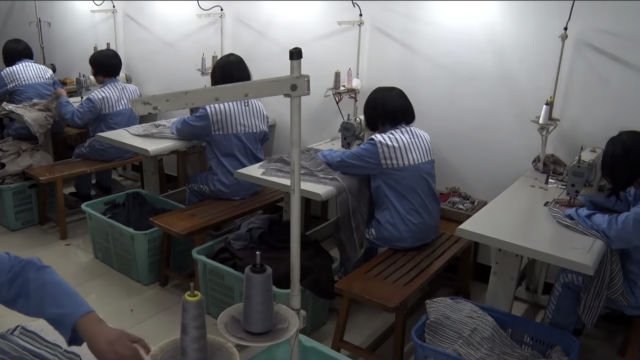A Church of Almighty God member was jailed for her faith in 2012. After years of torture and forced labor in a Chinese prison, her life will never be the same.

by Hu Ke
In May this year, a woman from southwestern China was released from prison after serving nearly seven years for being a member of The Church of Almighty God (CAG) – the most persecuted religious movement in China. She was sentenced in December 2012, at the age of 44, and came home a disabled and traumatized person, unable to work as a result of the forced labor and continuous mistreatment she was subjected to during her time in detention. She recounted her story to Bitter Winter.
Work in hazardous conditions
The woman was assigned to work in the prison’s sweater-knitting workshop, which was always dusty and smelled of chemicals, black smoke from a nearby prison factory would almost continuously penetrate it.
The believer was forced to work in these unbearable conditions for at least 13 hours a day. “I had to start work at 6:30 a.m. and would finish at 8 or 9 p.m., without breaks, except for mealtimes. I had to eat in a hurry; otherwise, guards would scold me,” the woman recalled. “I was rushed even when using the toilet. Failure to accomplish the daily quota would lead to punishments.”
“I always felt dizzy and nauseous breathing the smelly air in the workshop,” the woman continued. “After three months of working there, I started experiencing difficulty breathing, sometimes felt out of breath. But guards didn’t care about our health at all.”
Mistreated and beaten for not renouncing her faith
The woman was often subjected to beatings and torture for refusing to renounce her faith. Prison guards pressured her to sign the so-called “three statements,” i.e., the Statement of Confession, Statement of Criticism, and Statement of Break-up. She was once kept in a 4-square-meter solitary confinement cell for a month to make her sign the statements.
“That was a dark room without any light. I ate, slept, and relieved myself there. I was surveilled 24/7. The room smelled terrible, the stench nearly suffocated me,” the believer remembered. She was given very little food, often felt starved, and she was forced to sleep on the concrete floor, with only a blanket to cover herself.
Even after the month of confinement, she refused to sign the statements, so guards imposed more punishments on her. One day, a female guard dragged the woman to a corner, away from surveillance cameras, and stepped with a high-heeled shoe on the toes of her right foot, pressing until they started bleeding.
“I could feel the sharp pain in my toes. My big toe was grazed and bleeding; I left a trail of blood wherever I went. All my right foot toes turned purplish-black,” the woman recalled. “A guard once kicked hard the right side of my back. I felt like I was suffocating all of a sudden, and it took me quite a while to recover.”
The mistreatment persisted, prison guards employing a variety of means to torment her. She was sometimes prevented from washing for a month. The portions of her food were intentionally cut, she was forced to spend an entire night standing or stay upright in the sun on a hot day. Guards also ordered her cellmates to beat her in a brutal attempt to force the woman to sign the statements refuting her faith.
Disabled for life
The woman’s health started deteriorating drastically. She soon had to take a several-minute break just to climb one flight of stairs. At night, she couldn’t sleep because of heavy coughing. In August 2016, a prison doctor examined her and concluded that her lungs were infected, for which he prescribed her some medication. It didn’t help, and the coughing was getting worse. She was still required to work daily, completing her daily quota of attaching 600 tags to sweaters, regardless of her weakening health. If she didn’t reach the quota, she was punished.
In 2018, the woman was diagnosed with tuberculosis, but she was still kept in prison for more than a year. Before the imprisonment, the woman weighed 46 kilograms, but only 32 upon her release. When she returned home, a local physician confirmed that the delayed treatment of tuberculosis had irrevocably damaged her left lung, which now hardly functions and cannot be cured. The woman can no longer perform any physical labor. She is disabled for life.
Go to Source
Author: Hu Ke





